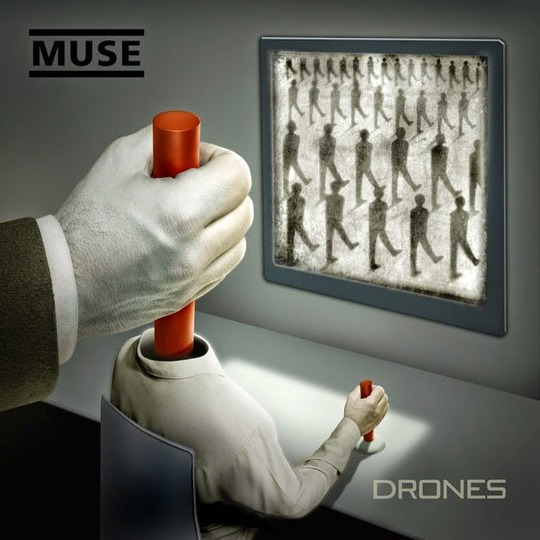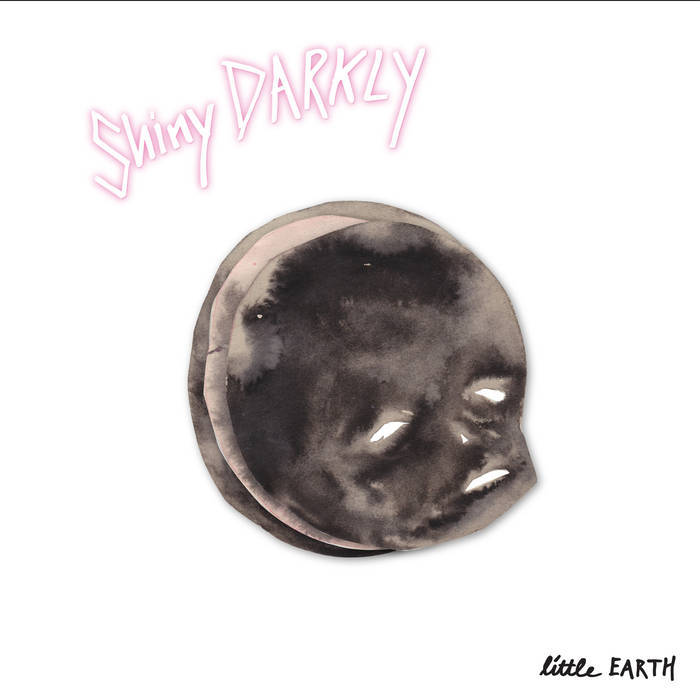Is it fair to rife through an artist's back catalogue and do the whole, 'Hey they used to sound like this, how do they now sound like this?' thing? Well, no, not really, especially when your chosen subject makes a conscientious effort to mix things up along the way. Plus, y'know, people get older and change and all that. That said, it'd be interesting to catch the insta-reactions of Showbiz and Origin of Symmetry-era Muse to the Devon trio's recent output.
Think back to the kick-in of 'Newborn', the brash assault of 'Citizen Erased' and, hell, even the swagger of 'Supermassive Black Hole'. They sounded focused, sardonic and unstoppable. Now they resemble a sci-fi rock opera that keeps feverishly tacking on ramshackle new pieces with no real care for consistency. In their continuing bid to thieve Queen's crown, Muse run the risk of disappearing entirely up their own arse. A largely patchy effort with no obvious peak or nadir, Drones doesn't quite get them there, but it gives the mission a right good go. When news of his band's seventh record broke, Matt Bellamy issued the following statement:
'To me, "Drones" are metaphorical psychopaths which enable psychopathic behaviour with no recourse. The world is run by Drones utilizing Drones to turn us all into Drones. This album explores the journey of a human, from their abandonment and loss of hope, to their indoctrination by the system to be a human drone, to their eventual defection from their oppressors.'
Released, as it was, next to the record's jaw-droppingly appalling artwork (seriously, just look at it), the above quote didn't quite receive the scrutiny it perhaps deserves. It's difficult to read such a nonsensical ramble and not wonder if the man is truly lost in space. As you might imagine, his paranoia feeds Drones from the get-go, the album's unnamed protagonist trading his torment in for reprogramming and macabre instruction before realising perilously late that this may not have been the best course of action after all. Ho and, indeed, hum. Though opening bow 'Dead Inside' is a breezy mechanical jaunt in the same vein as the Eurythmics-aping 'Undisclosed Desires', it immediately feels like you've heard it all before. In that regard, Drones makes for a fair enough moniker.
Lyrically, to attack Bellamy is to claim victory with considerable ease, so why bother? He's never been all that interesting and Muse have never been the cutting social commentators they so clearly believe themselves to be. Here, Bellamy conflates the very real and distressing issue of drone strikes with the dissolution of his relationship with actress Kate Hudson, hand in awkward clammy hand alongside a pummelled-into-submission theme of breaking promise and spirit down into docile regurgitation.
There are flashes of that earlier bite peppered in amongst the homogeneity; the frenzied pace of 'Reapers', a lengthy, punchy-if-familiar guitar swerve in the midpoint of 'The Handler' and the Marilyn Manson-lite snarls that trail the chorus of 'Psycho', a fairly by-the-numbers riff monster ultimately undone by excess and outright stupidity. Muse have never been interested in doing things by halves and they don't so much as lean into prog these days but rather wear the face off it, yet there is a difference between bold experimentation and simply throwing in too much and sounding terribly burnt out as a consequence. 'Psycho', roaring drill sergeant and all, would be scoffed at were it a student outfit's first decree. As the lead single for a hugely-successful, supposedly forward-reaching act in their 21st year, it's astonishingly feeble. Fans will point to the likes of 'Reapers' and 'The Handler' as career-best work but, despite impressive intricacy, it's still just Muse colouring inside carefully-drawn stock lines.
Drones strains rigidly at every turn, even when seemingly taking off on a flight of fancy. It simply lumbers from one phoned-in point to the next with the odd, brief glimmer in between. 'Mercy', 'Defector', 'Revolt' and 'Aftermath' are as simpering and wretched as anything the band have ever come up with. The latter two are just odd, emerging as the kind of thing you'd play over a scene from a saccharine American high school TV show montage and its end credits, respectively. They're downright bizarre, but sadly not fun bizarre like the knowingly ludicrous 'Panic Station'. Why Bellamy feels compelled to tap into this side of himself at this stage of the game is beyond my comprehension.
It is in 'The Globalist', though, that Muse's conflict between then and now is most deeply illustrated. In the space of ten minutes, they veer from Morricone to metal to an adaptation of Edward Elgar's Nimrod. Accordingly, it's a strange beast; admirable, intriguing and frustrating, the sound of a once high-octane force having a short war with itself before finally settling down with piano-led musings to the heavens in the manner of a grand tragedy. Accomplished yet instantly forgettable - a most fitting curtain call for such a confused endeavour.
-
4Dave Hanratty's Score
-
6User Score






















